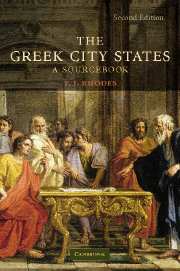Book contents
- Frontmatter
- Contents
- List of Maps
- Preface to the First Edition
- Preface to the Second Edition
- Map 1 The Greek World
- Map 2 Attica
- Introduction
- 1 The Homeric State
- 2 The Archaic State
- 3 Economic and Political Development; Tyranny and After
- 4 Sparta
- 5 Athens
- 6 Women and Children
- 7 Economic Life
- 8 Religion
- 9 Other Cities
- 10 Beyond the Single City
- 11 The Hellenistic and Roman Periods
- Bibliography
- Index of Texts
- Index of Names and Subjects
7 - Economic Life
Published online by Cambridge University Press: 05 June 2012
- Frontmatter
- Contents
- List of Maps
- Preface to the First Edition
- Preface to the Second Edition
- Map 1 The Greek World
- Map 2 Attica
- Introduction
- 1 The Homeric State
- 2 The Archaic State
- 3 Economic and Political Development; Tyranny and After
- 4 Sparta
- 5 Athens
- 6 Women and Children
- 7 Economic Life
- 8 Religion
- 9 Other Cities
- 10 Beyond the Single City
- 11 The Hellenistic and Roman Periods
- Bibliography
- Index of Texts
- Index of Names and Subjects
Summary
The standard Greek ideal was of self-sufficient agricultural communities, in which most households lived primarily off the produce of their own land. Ownership of land and citizenship tended to be linked, so that in Athens the right to own land and a house was a privilege granted to specially favoured metics but not enjoyed by most (cf. passage 168). In practice, even in the smallest and simplest communities some men might earn their living as craftsmen (though they might still own and cultivate some land); and, as communities developed, activities became more specialised and contact between different communities in different places increased, there will have been a growing range of possible livelihoods and a growing number of men who lived otherwise than as farmers (cf. already Solon of Athens, at the beginning of the sixth century: passage 32). The availability of slaves to do menial work led to its being considered degrading for a free man to be permanently employed in working for another (cf. passage 181).
FARMING
Farming the most basic occupation
Plato in his Republic envisages as a minimal community a farmer and a few crafts men.
‘Come, then’, I said, ‘Let us in theory create a city from the beginning. What will create it, it appears, is our own need.’
‘Of course.’
‘So the first and greatest of our needs is the provision of food, for the sake of existence and life.’ […]
- Type
- Chapter
- Information
- The Greek City StatesA Source Book, pp. 181 - 197Publisher: Cambridge University PressPrint publication year: 2007



